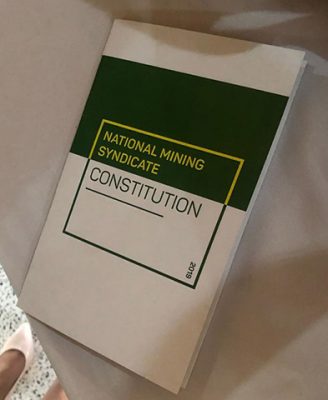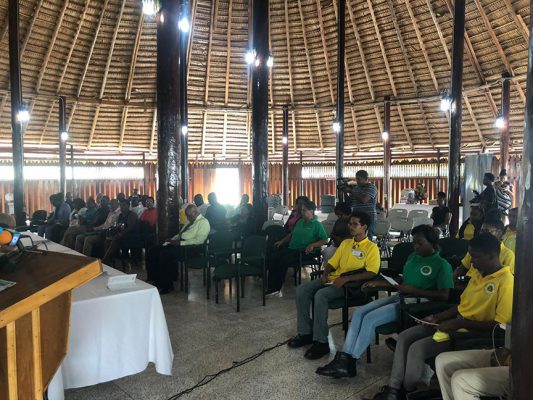Minister of Natural Resources Raphael Trotman yesterday charged the National Mining Syndicate to demonstrate sound administration and operational practices as the Constitution for the gold miners’ body was officially unveiled.
Speaking at the event at the Umana Yana yesterday morning, Trotman recalled that the establishment of the mining syndicates by his ministry was done in response to the overwhelming interest shown by Guyanese in entering the industry and earning an honest living, despite lacking knowledge, access to viable mining lands and equipment.
The syndicate initiative was therefore created to provide an opportunity for the ministry to respond to the pleas of small miners by introducing a model that will encourage collaboration and also bring order to artisanal and small scale mining practices by allowing groups of like-minded Guyanese with similar goals and aspirations to work together. Several mining syndicates have since been established as well as an overarching National Mining Syndicate Inc.

“What do we require of you now that you have a formal legal document? We desire to see a robust model with syndicates that have sound administration and operational practices. We expect to engage with you and with the national body. We ask that you abide, as you have been [doing], with the laws and regulations of the land and we ask that you make your contribution to the national reserves by selling your gold at the Gold Board and not to any other entity,” Trotman remarked.
According to the constitution unveiled yesterday, the National Mining Syndicate Inc is a gender neutral, nonpolitical parent body of all the mining syndicates in Guyana. Its purpose is to co-ordinate and facilitate the consultative and participatory process regarding the individual syndicates by assisting them to find solutions to problems that may arise with regards to mining and other related operations that involve the extractive industry.

Trotman said that the ministry has heard the demands of the syndicates for more roads, lands and concessions and while they would have met the syndicates halfway as it relates to granting lands and rehabilitating some roads, the ministry is aware that it is not sufficient and will be working to do more.
He said he believes that the constitution demonstrates that the mining syndicates are putting their “house in order” and will now have higher expectations, which include more structured forms of engagement, both at the level of the ministries of Natural Resources and Finance, as well as with the Guyana Geology and Mines Commission.
“We recognise too that with most things in life, dedication, commitment and hard work are needed for us to continue moving forward and this is never an easy task, especially when you are forging new paths. So I urge you to remain focused. The constitution provides a framework to guide this process and I encourage you to engage with it, support it, make it your own and give it life,” he said.
The ministry has prepared 200 copies of the constitution for distribution. About 150 will go to the Secretariat of the National Mining Syndicate while the remaining 50 will be distributed to the relevant agencies and authorities.
Also speaking at the event was attorney Camilla Edwards, who gave an overview of the new constitution. She said that the document is not too loaded with legal jargon and simple enough for easy interpretation.
“I would say to you this morning that this constitution is not perfect, and because it is not perfect, it can be amended to suit the needs of the syndicate and those who will rely upon it for guidance,” she said.
The attorney said the document will be a reference to which members can refer in order to keep their syndicate on the course on which they have embarked. They can also work along the principles to make their organisation more effective, she added.
‘Enough recognition’
Head of the National Mining Syndicate, Cheryl Williams, meanwhile, observed that there has been concern that the syndicates have not been given enough recognition, which the document will help to improve.
“The National Mining Syndicate is already a corporate body…and so now this constitution, which is a lofty document, will promote those ideas and principles and visions. It is the syndicate’s hope that the operation of that entity will be very, very effective and it will be recognised by all the other entities with whom the mining community have come into contact,” she added.
The constitution consists of 29 Articles, which include the creation of offices for the executive as well as outlining the way they should conduct themselves. It includes provisions as it relates to membership, policies and duties of the National Mining Syndicate.
According to the objectives, the National Mining Syndicate aims to be the primary advocate with a unified voice for reasonable, sustainable and safe exploration within the extractive industry by establishing and promoting sound public policies at all levels of the industry, educating the members about the benefits and the uses of the resources of the industry.
It also seeks to collaborate with the government of Guyana and governments across the world, non-governmental organisations, civil societies and international organisations to eradicate human trafficking using the four pillars – prevention, protection, prosecution and partnership.
It also said that it is aiming to ensure that Guyana’s rights are respected in the extractive industry, including the oil and gas sector, and that they are provided a seat on various Boards within the extractive sector.
Additionally, the body aims to facilitate engagement with the government of Guyana and the respective ministries and agencies to advocate for better labour relations within the sector and to help in contributing to the decision-making processes affecting health, security, protection and conservation of the environment as well as improvement of policies and laws that govern the sector.
It also seeks to operate in accordance with the regulations that govern the Anti-Money Laundering and Counter Financing of Terrorism Act of 2009, to assist the government and collaborate with all stakeholders in the fight against human trafficking and to promote policies that will help to develop the extractive sector in keeping with the Mining Act 20 of 1989 that will enhance a green economy and a safe environment.





